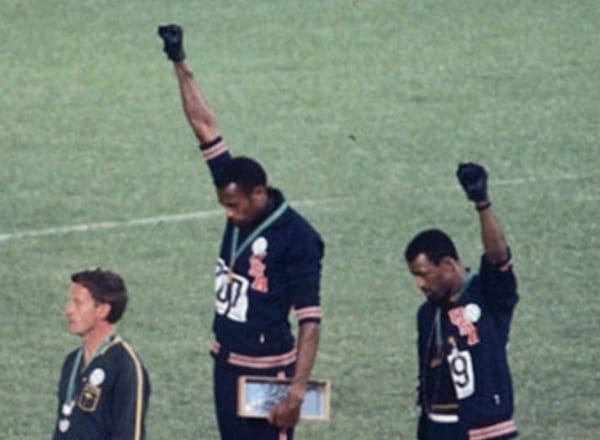For a reason I can’t quite put my finger on, I found myself thinking about athlete activism throughout history, and how sports have been a big part of standing up to tyranny and oppression. The place of athletes to speak out is always debated but, as these examples show us, athletes have made tremendous impacts on history already. A person’s job doesn’t define who they are and the value of their opinions, or are we forgetting a certain wise carpenter a lot of people love? What ever happened to Al from Home Improvement anyway?
I looked back through history trying to find some uplifting examples about how an athlete can make a dramatic impact on their world. All of us have this power, for better or worse. If you see something you can no longer abide about this world you should feel duty bound to change it. Just like some of these people did.
Seven Athletes Who Stood Up to History – (spoiler: it’s actually 9 people)
Peter O’Connor – 1906 Olympics
One of the most famous athletes in the world in his time, holding the world long jump record at over 24 feet. On arriving at the 1906 Olympic Games, he and his teammates discovered that due to politics and Olympic Committee rules, they had been listed as British athletes and given British uniforms and flags. If you’re not familiar with Irish politics, this is like handing a Red Sox fan a Yankees cap to wear, only with a long history of actual violence and oppression on top of the dominance. O’Connor did what any good Irishman would, after winning his medal he surprised the crowd and the world by raising an Irish flag with the Gaelic phrase “Erin go Bragh” which translates to “Ireland til the end of time.”
Warning: Old-timey content:
Jesse Owens and Mack Robinson – 1936 Olympics
1936 was a year of tumult throughout the world. The Olympics were scheduled to be held in Berlin, immediately in the middle of Adolf Hitler’s rise to power. Powder meet keg. Hitler was determined to make the games a spectacle of his perceived Aryan dominance, spending a fortune building and upgrading German stadiums and facilities, and commissioning Nazi propagandists to cover every moment. Enter Jesse Owens and Mack Robinson, two American track stars who were decidedly not Aryan. The black athletes dominated the Nazis, with Owens winning four gold medals, and Robinson a silver in the 200-meter behind Owens. After firing the first shot in the battle against history’s greatest monster, both men returned home to discrimination and poverty, because this is an American story. Owens famously remarked “I have four gold medals, but you can’t eat gold medals.” The less famous Robinson returned to his Pasadena hometown a poor man, the only work he was able to find was as a street-sweeper. A job during which he would wear his Olympic jacket on cold nights. Until the city made him stop. Then they fired him and all of the city’s other black employees to fight an effort to de-segregate the city’s public pools. Did I mention that Mack is the older brother of Jackie Robinson? So a family of American heroes.
Jackie Robinson – Baseball
I sincerely hope this isn’t the first time you’re hearing about this Robinson. On April 15, 1947, Jackie Robinson broke baseball’s color barrier, a day which should be honored by something better than being income tax day in this country. Just playing in the game that day didn’t solve everything of course. Robinson endured an unimaginable amount of abuse from fans, opponents, and even his own teammates with a shocking amount of patience and grace. In later years, Robinson would become a civil rights leader. When Jackie worked with Martin Luther King Jr. on a goal to get 1,000 students to attend a march to the Lincoln Memorial in 1958, the Youth March for Integrated Schools drew over 100,000 students of every race and color.
We get history docs all the time, let’s take a look at how damn good Jackie Robinson was on the field.
Bill Russell – Basketball
One of the greatest NBA players of all time, Russell has more championship rings than he does digits on his hands. Everyone knows about his incredible accomplishments on the court, but prior to the 1961-62 season, Russell and several black teammates were in Lexington, Ky. for an exhibition game. After experiencing the systemic racism in place in the city, notably being refused service at a local restaurant, Russell and his teammates decided to skip the game in protest. The incident haunts Russell to this day, and he continues to speak out against racism; here’s a three-hour video of him doing so.
Related
- Stolen Perfection: Armando Galarraga Nearly Made History 10 Years Ago Today
- “F-K With Nails You Get The F-Ing Hammer”: Lenny Dykstra Has A Problem
- Danish Football Team Invents Drive-In Soccer And It’s Cooler Than You’d Think
You’ve seen the picture, but do you know that, according to Tommie Smith himself, the gesture was on behalf of humanity, and was not a “Black Power” gesture, as it was widely misinterpreted? There were several symbolic gestures made during their statement, in addition to the powerful saluting image. The two American athletes received their medals wearing no shoes, but black socks to represent black poverty; Smith a black scarf for black pride; Carlos an unzipped track suit in solidarity with blue collar workers around the world, and a necklace of beads dedicated to unnamed individuals lost to history’s racism. The moment is powerful and enduring, both athletes went on to play in the NFL, but this was their world-changing moment.
Arthur Ashe – Tennis
Arthur Ashe is another name I really hope you’re at least aware of. Not only is Ashe a Hall-of-Fame tennis player, he became a civil rights icon and is an inspiring hero. Throughout the early 1970s, Ashe made three attempts to visit the troubled nation of South Africa to play an exhibition tennis match, and use his fame to make what difference he could in the struggle against Apartheid. The despicable practice of acknowledged deliberate white supremacy had been in place since 1948, and would somehow last until 1991, but in 1973, Ashe made the first dent. Finally succeeding in creating a match, Ashe bent the racist South African government to the will of an African American man, forcing them to integrate Johannesburg’s Ellis Park. Ashe would go on to be an activist for civil rights for minorities as well as the gay and lesbian community. Just five months before his 1992 death from AIDS, Ashe was arrested protesting for a group of Haitian immigrants to be allowed entry to the U.S.
Colin Kaepernick – Football – ongoing
I could have put another 30 examples of athlete activism here. When you have time, Google: Billie Jean King, Tom Waddell, Feyisa Lilesa, Ron Mix, Brittany Grenier and so very many more; their stories deserve our attention. Colin Kaepernick’s fight is taking place on our streets right now. In many ways this is about two horribly different ways in which men took a knee. Kaepernick’s kneeling in protest of systemic racism in policing in the United States got him kicked out of the NFL. You won’t find any documents or league mandates saying so, but that’s what happened. Racist, or at least uncaring — which, let’s be honest, is the same thing — owners and fans campaigned against Kaepernick to the degree where teams preferred to lose with bad quarterbacks than sign a pretty good one who doubles as an American hero. We’ll never know the career that Kaepernick sacrificed, but we know he willingly gave up millions of dollars to fight for this cause, taking on the bigots from the stadium to the White House.
Check us out on TWITTER, where we talk sports, share articles, and have lots of giveaways!
🔥 Hot from Side Action 🔥
- Lala Anthony Blames Knicks for the ‘Demise of their Relationship’
- Ja Morant Being Linked to Singer Lotto’s Sister Brooklyn
- Rumor: Instagram Model ‘Ayyyejae’ Connected to Phoenix Suns Is Now Pregnant by NBA Player
- Rumor: Jalen Rose Spotted With New Girlfriend Angela Rye
- Spurs Josh Richardson is Dating Former America’s Next Top Model Runner-Up Tatiana Elizabeth




















